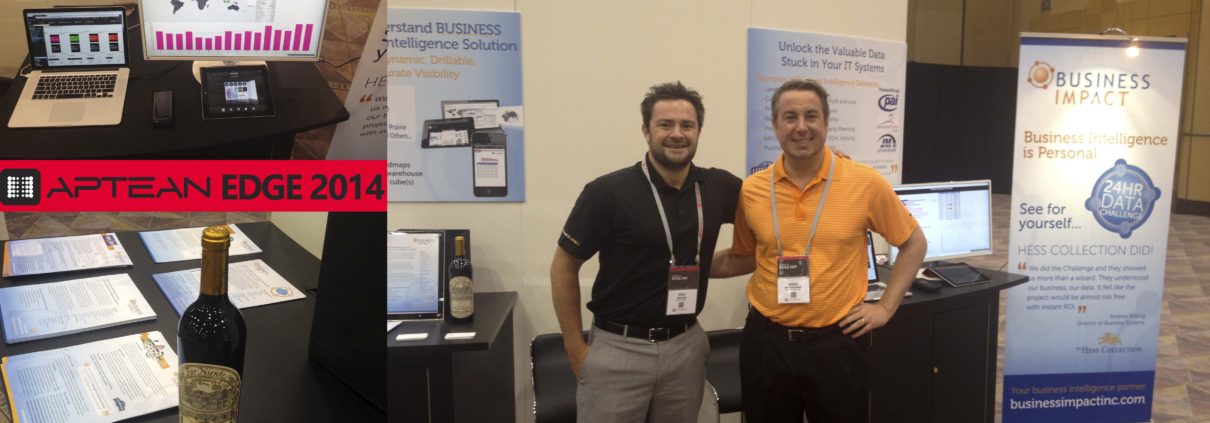Aptean BI – Business Intelligence Review
Aptean announced at its Edge conference a corporate BI platform in QlikView. One size will fit all. Pre-integrated dashboards ready to go; you could change them but then that is your responsibility. These were the messages regarding Aptean BI.
What does that mean for its customers, specifically in the Ross area where we have quite a bit of overlap here at Business Impact? Unfortunately we believe this means that Aptean has some learning to do regarding business intelligence.
In the session called Aptean Business Intelligence Strategy, the background was nicely set. Aptean has acquired a number of production software systems like Ross, all with different BI solutions.
Aptean’s due diligence was heavily weighted by Gartner, the software analyst firm. The final decision was QlikView over Microsoft BI, mainly because of version control. Microsoft’s BI required many layers of its technology and ensuring all customers were using the same versions of SQL Server, Sharepoint, Power BI, Office and whatever else is included in Power BI would be near impossible.The goal was a single BI platform that could cross system platforms – such as when a Ross customer also runs Pivotal CRM and Factory MES. Understandable, for sure.
Meanwhile, QlikView is listed in the Leaders quadrant of Gartner, though my observational history with Gartner has been that the Leaders are the ones willing to pay the most for advisory services to Gartner. Another aspect listed was QlikView’s in-memory technology, which is definitely hot today.
Functionally, the biggest reasons given for QlikView were “data discovery” and “associative BI”. These were game changers, according to Aptean. Implied here is that the current BI tools were not providing these. This is ironic because the first BI tool Aptean is replacing is EPM powered by TARGIT. The irony comes from the fact that TARGIT is really very good at data discovery and associative BI when set up properly (the real downfall of most BI projects).
Pricing was not specified, but Aptean stated that this is not an upgrade and that customers will have to license Aptean Analytics. Starter packs would be sold where QlikView is embedded as part of the solution, and customers will receive pre-built dashboards and connectors plus some form of QlikView. One caveat, the customers must be on the current version of Ross/Pivotal/Factory. Separate Ross, Pivotal and Factory only solutions will be released as well soon. One question that came to our mind was: How many customers are current on all three software platforms at the same time now?
As for services, Aptean told customers they could be live on the application in less than an hour, depending on data load. Data loads and services were in general ignored, as was the roles of people utilizing them, project managing and other skills. In the end, this is the area where it seems like Aptean doesn’t understand the value or didn’t communicate that it did understand. And it’s the most important area (said from a BI consultancy, I know) because of all the permutations of implementations, multiple data sources, different types of corporate structures and more.
Back to the review for a moment, the visualizations from Aptean Analytics are nice though basic. QlikView does a strong job of Ad Hoc building and the web interface looked fast on the 23,000 records they were showing. The dashboards in general looked like a standard BI demo though with Ross demo data.
This leads us to the point of Analytics and Business Intelligence in general, and one that Aptean has missed with their release. Business Intelligence is personal. What data is needed… how a system is implemented… what role needs what dashboard… These vary site to site, role to role, and day to day.
At Business Impact, our stance has been and remains that a one-size fits all tool fits no one. And while QlikView / Aptean Analytics does offer the ability to make changes, so did EPM and so do most BI tools.
Business intelligence requires effort to make it fit: to architect in scalability, to allow for extension capability and to handle scope change. Who does that? That’s the $64,000 question, and one that is not answered by Aptean Analytics. Questions like how hard is it? Who does it? What is their skill set? Or more questions: has the business changed? When will it change again? How will we change our BI?
BI tools are incredible when in the hands of people who understand ALL of the following: business acumen, dimensional modeling, data integration, incremental loading, data visualization and the best practices of business intelligence. That’s a lot of roles.
The problem in Business Intelligence is that no one services person or developer can handle all these roles. If you have an uber-analyst, then they probably don’t know how to deal with enterprise scaling and security? If you have a DBA, they probably don’t know how to define inventory days on hand or why you would have different definitions based on the kind of business or seasonality of products.
One needs a skilled BUSINESS INTELLIGENCE team to support a business intelligence tool selection. One that understands that until you understand the business, you won’t ever get to business intelligence. It will just be reporting.
Just as one example, the sales dashboards shown at Edge were simple – sales by product and region and customer over time. None reached any depth such as demonstrating inventory levels at the same time as sales velocity and current open orders. And that is the kind of reporting and analysis that customers do.
So Aptean will offer turn-key BI with a new product. Like Ross’ previous BI attempt – EPM – it’s focus is on the turn key and it ignores the key lesson they should have learned from EPM for the last 10 years, that BI is personal.

